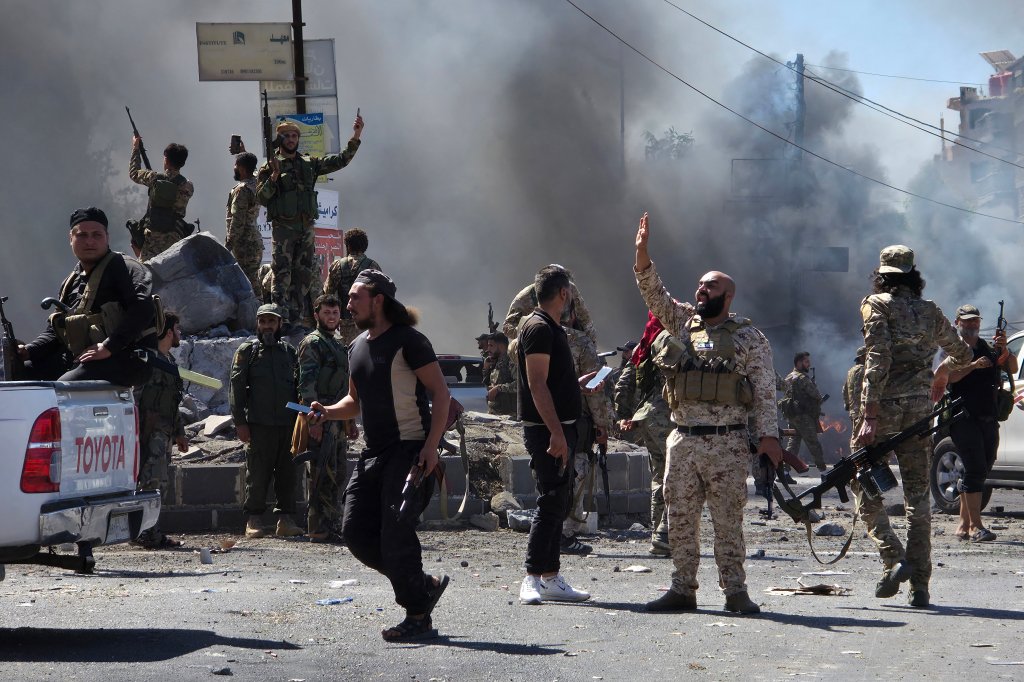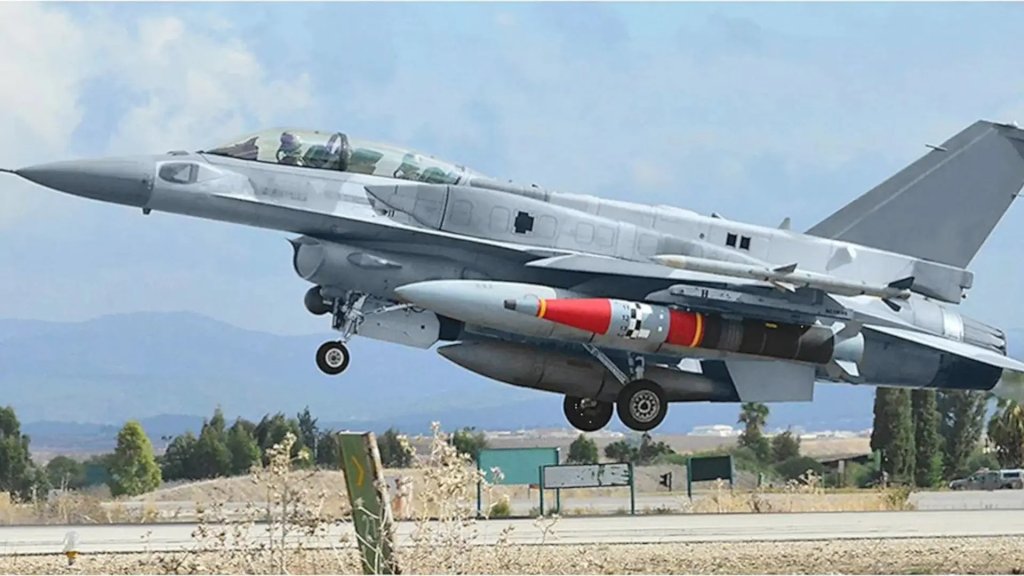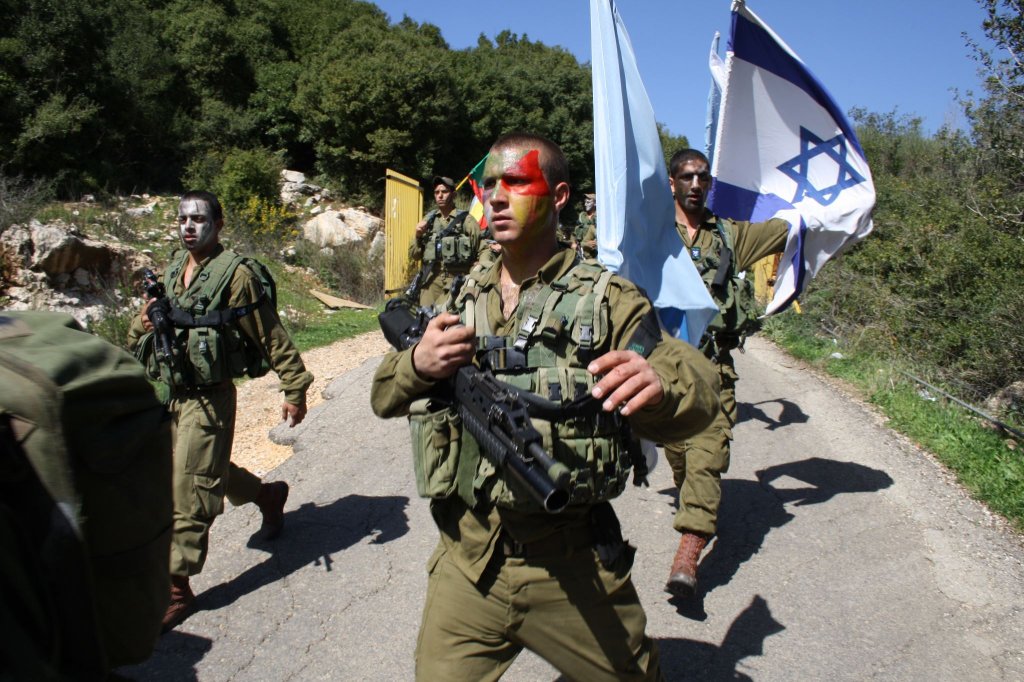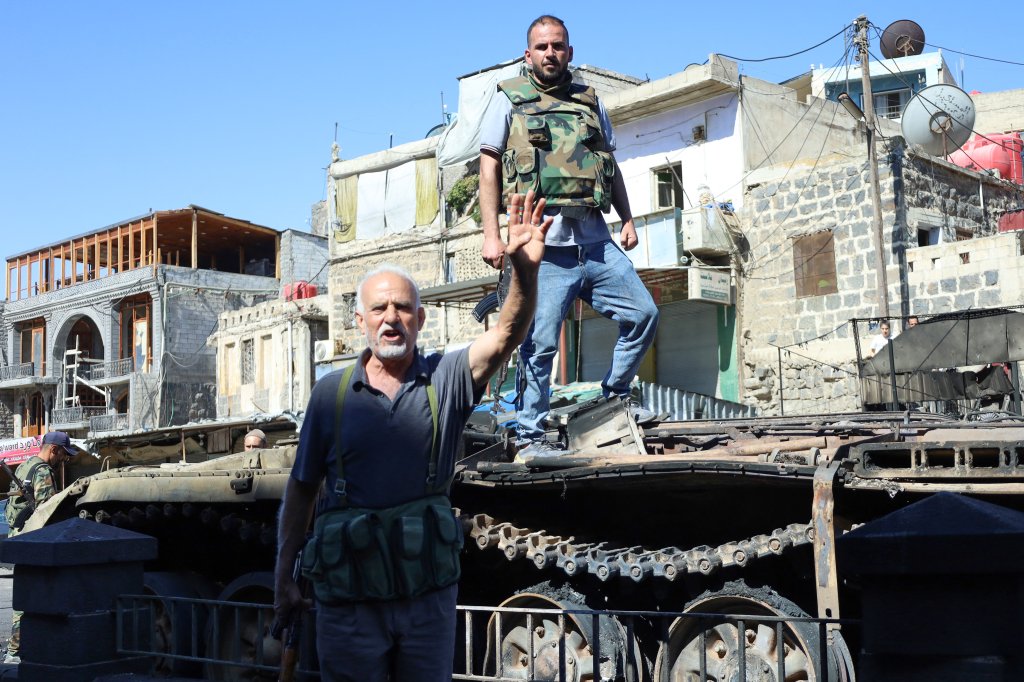On Monday, The War Zone conducted an 80-minute-long exclusive interview with the first member of the Druze community to serve as an aviator in the Israeli Air Force (IAF). The conversation took place as a ceasefire was being finalized between Druze and Bedouins in and around the southern Syrian city of Suweida. Fighting there drew in Syrian regime forces as well as the IDF, which wound up bombing Damascus supposedly in support of Israel’s Druze allies.
The Druze are an Arab sect of about one million people living in Syria, Lebanon and Israel, where they make up a small but influential minority. The community has varying loyalties to both Syria and Israel. While they are a majority in Syria’s southern Suweida province, over the last decade, the Druze have been caught up in the violence between forces loyal to and fighting against dictator Bashar al-Assad. He was deposed last December in a stunning 12-day coup.
 Syria’s security forces enter the predominantly Druze city of Suweida on July 15, 2025, following clashes between Bedouin tribes and Druze fighters that have killed nearly 100 people. (Photo by Sam HARIRI / AFP) SAM HARIRI
Syria’s security forces enter the predominantly Druze city of Suweida on July 15, 2025, following clashes between Bedouin tribes and Druze fighters that have killed nearly 100 people. (Photo by Sam HARIRI / AFP) SAM HARIRI
The tactical jet crewman, whom we have to refer to as “Lt. Col. I.” under Israeli security practices, is an F-16I Sufa navigator (weapon systems officer in U.S. parlance). Lt. Col. I. talked about flying attack missions on Iran, taking shelter at an airbase during an Iranian missile barrage and his thoughts about being the first Druze aircrew member. He also discussed what it’s like flying and fighting in the F-16I, the attributes of other IAF aircraft, and defended Israel’s controversial airstrikes on Gaza.
The navigator comes from a famous military family. His grandfather was a Druze warrior who fought against Israel during its War of Independence in 1948, later joined the Syrian Army and ultimately became a member of the Israel Defense Forces (IDF), the only man to serve in both armies.
Because Lt. Col. I. offered so many fascinating details, we decided to break our interview up into two pieces. Today’s piece is about what it is like being the first Druze to fly with the IAF and the current situation in southern Syria. Tomorrow’s installment will be about his role flying in the F-16I with the IAF, the missions he’s been on, the IAF’s inventory, his thoughts about Gaza attacks and much more.
The questions and answers have been edited for clarity.
 Elders of the Druze community gather during a meeting in the Druze village of Majdal Shams in the Israeli-annexed Golan Heights on July 16, 2025. (Photo by Jalaa MAREY / AFP) JALAA MAREY
Elders of the Druze community gather during a meeting in the Druze village of Majdal Shams in the Israeli-annexed Golan Heights on July 16, 2025. (Photo by Jalaa MAREY / AFP) JALAA MAREY
Q: What was it like to grow up with such a famous Druze warrior like your grandfather?
A: So he was my hero when I was young, and I was able to grow up on his stories and his heroism and all the things that we heard about him, and he was very respected in our community. And I hope that I continue his name as well.
Q: Tell me some more about your background, growing up as a Druze. And why join the IAF?
A: So I grew up a small Druze village in the Carmel Heights [in Israel]. I spent my youth studying in Haifa, at a school there. I didn’t learn in our village. I learned in Haifa, but what I did to maintain contact with my friends in the villages was to play football and be an instructor. Afterwards, I joined the Army. It wasn’t my dream to join the Flight Academy, but I passed all the exams and went directly to the Flight Academy, which was quite unique, because before me, there was not even one Druze who finished the Flight Academy in the history of Israel. But there were two others who started the Flight Academy before me, but they didn’t finish. So in 2001, I started the Flight Academy.
After two years, I finished as a navigator – which is called the weapon system operator in the U.S. Air Force. I was assigned to the joint squadron at Ramat David [Airbase].
 An Israeli Air Force F-16I Sufa fighter. (IAF) IAF
An Israeli Air Force F-16I Sufa fighter. (IAF) IAF
And all the duties that I did were in the Air Force. Most of my jobs were in operational roles, like commander of the attack section in the Air Force. And the last role that I did was with Southern Command. It wasn’t under the title of the Air Force. I was under the title of the Southern Command, but as a pilot who is the coordinator between the Air Force and the ground troops. That’s what I did in the last two and a half years. Most of the duty was to coordinate the Air Force tasks and missions in the Gaza Strip…”
Q: What was it like being the first Druze aviator in the IAF?
A: At first, I didn’t feel like I was special because I was one of the 35 that finished the Flight Academy, and I didn’t feel that I was different from them, because I was one of the guys. But each time that I came to the village, and of course, speaking with my friends and my family, everybody feels that it’s special what I’m doing, because I was the first one. And finishing the Flight Academy is a very big thing in Israel, generally, but especially to be the first one to finish as a Druze.
Q: When did you graduate?
A: 2003, 22 years ago.
Q: How are Druze treated in Israeli society and the military?
A: We feel as equal as the other soldiers or officers in the army. We don’t volunteer for the army. It’s mandatory. The Druze people join the army in the same way as the Jewish people. In the army, all the sections, all the forces are open to Druze soldiers. But that started like from 2000 and now you can see Druze who are in very high ranks in the army and all the forces, all the tasks, even in the very, very classified roles. And as a I can say from my story, I didn’t feel for one second that I’m different than the others, or that I was treated differently. I was examined by my skills, and that’s it.
Q: What changed in 2000 with regard to the Druze serving in the Israeli military?
A: I think that the state decided to make the change and approve the Druze to join all the sections in the army.
 Druze soldiers in the IDF. (IDF)
Druze soldiers in the IDF. (IDF)
Q: There are many facets to Druze internal politics, society and relations. Can you talk a little bit about that?
A: In Syria, the situation is very complicated. We are hearing about the cease-fire. But it’s not a solution that can be maintained for a long time. That’s why we need to think about a solution that will make the area…more suitable to stay in for the Druze. I think that Israelis should think about the strategic necessity of a buffer zone north of the border. I think from a security standpoint, we shouldn’t allow Israel to let theoretical jihadists stay over the north border.
Israel should create a buffer zone and keep the Druze there with Israeli defense on it so that we don’t take another 7th of October like we did in Gaza. Because if we leave the situation as we see now, I think that we will see in weeks or months again, Bedouin tribes will decide to get up in the morning and go to kill some Druze, just because of the ideology of ISIS and terrorism. The morale and the spirit of the Druze warriors in Syria, the spirit is high because we believe in faith, we believe in our strength, we believe that we can fight. But unfortunately, we don’t have the equipment necessary to make a fair fight. That’s why we need the Israelis inside, to join the fights and defend the Druze villages.
 Syrian Druze fighters celebrate atop a damaged army military vehicle, after Syrian government forces pulled out of the southern Suweida governorate, on July 17, 2025. The Druze heartland Suweida has been gripped by deadly sectarian bloodshed since July 13, with hundreds reportedly killed in clashes pitting Druze fighters against Sunni Bedouin tribes and the army and its allies. (Photo by Shadi AL-DUBAISI / AFP) SHADI AL-DUBAISI
Syrian Druze fighters celebrate atop a damaged army military vehicle, after Syrian government forces pulled out of the southern Suweida governorate, on July 17, 2025. The Druze heartland Suweida has been gripped by deadly sectarian bloodshed since July 13, with hundreds reportedly killed in clashes pitting Druze fighters against Sunni Bedouin tribes and the army and its allies. (Photo by Shadi AL-DUBAISI / AFP) SHADI AL-DUBAISI
Q: What are you hearing from folks in those villages? I know there are some Druze who support the Syrian government, and some who want to see the Israeli government providing protection.
A: Yeah, we hear about those two sides of the story, but most of the Druze in Syria see what the Syrian regime, the new regime, did to the Alewites after they dropped their weapons. So if we see that the story that happened with the Alewites, you can’t ignore that and do the same with the Druze villages. You can’t actually drop your weapon and think about, okay, there will be peace and they won’t hurt us. The ideology of the jihadist, the ISIS, is actually to make the whole country based on Sharia, based on the belief of the ideology of Islam. So the Druze…in Suweida, they are smart. They saw what happened, and they decided not to drop their weapons and actually to make an autonomy based on agreement with [Syrian President Ahmed al-Sharaa] that they won’t enter Suweida, and they’ll keep their autonomy there. But I think that the goal of the new regime is actually to take over all the Syrian parts, all the Syrian tribes, all Syrian religion and make it under one flag of the Syrian new regime. So they decided to take the Bedouin tribes and sent them to hurt the Druze, then afterwards, coming like knights and helping the Druze…
Q: And do you know a lot of people who have suffered? There have been reports of horrific sectarian violence committed against the Druze. Do you know people who’ve had problems like that?
A: We see the videos, and we are in touch with the people inside the villages. We talk to them, not me personally, because I’m still in the reserve, but I have family there. My father’s cousins are still living in Syria, in Suweida, and the village is near to it. So we hear from them, and we see, actually, now, with all our planes and all our drones, we see that the situation there is very complicated. There’s a siege on the villages. We see all the troops coming to the Druze villages. And the situation there, humanitarian, is very, very low. It’s very, very hard. But the community of the Druze, wherever we live, even if it’s in Syria, Lebanon or Israel, we share a deep sense of solidarity and mutual emotional responsibility. We go beyond the borders. We have a common history. We have a common faith. We share the same destiny. So whatever happens in Syria hurts us, hurts me. We can’t stand by and not take action.
Tomorrow, Lt. Col. I. talks about his time in the IAF.
Contact the author: howard@thewarzone.com
Howard is a Senior Staff Writer for The War Zone, and a former Senior Managing Editor for Military Times. Prior to this, he covered military affairs for the Tampa Bay Times as a Senior Writer. Howard’s work has appeared in various publications including Yahoo News, RealClearDefense, and Air Force Times.
